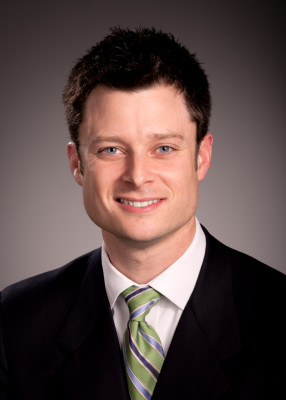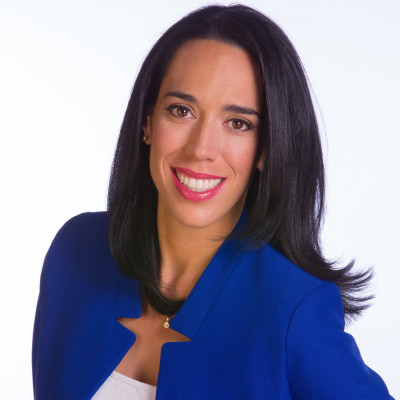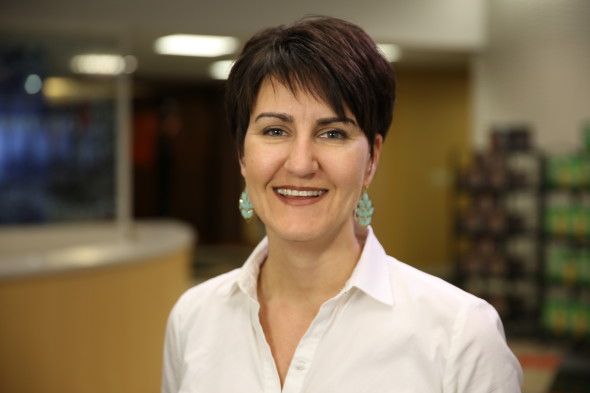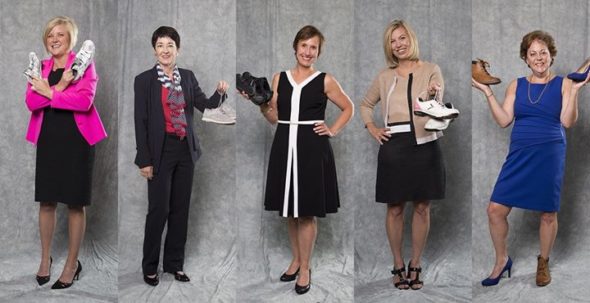Students, alumni, and the St. Louis community are invited to a panel discussion featuring Olin’s first Emerging Leader honorees at 5:30 p.m., Thursday, April 16, 2015 in Knight Hall. A reception will follow to celebrate these five recent Olin alumni who exemplify our mission to create knowledge, inspire individuals, and transform business.
 When Tamiko Armstead, MBA ’06, studied at Olin Business School, she aimed at new leadership roles at the Edward Jones investment firm. She never imagined that every course would one day help her run Cardinal Ritter College Prep, her high school alma mater.
When Tamiko Armstead, MBA ’06, studied at Olin Business School, she aimed at new leadership roles at the Edward Jones investment firm. She never imagined that every course would one day help her run Cardinal Ritter College Prep, her high school alma mater.
“As president I’m responsible for strategy, fundraising, organizational management, and finance.
All those classes that I took I’m tapping into now,” says Armstead, who came to Cardinal Ritter in 2014. “I kept notes and books that I now use as references.”
She also connects and collaborates with fellow Olin students
and with Washington University, partnering on STEM programs and more—working, she says, “to make Cardinal Ritter one of the premier high schools in the country.” Located in midtown St. Louis, it’s one of only ten co-ed Catholic African American college prep schools in the United States.
 For Datotel, LLC, founder and president David Brown, MIM ’03, MBA ’04, his Olin education never stops even though the classroom is a decade distant.
For Datotel, LLC, founder and president David Brown, MIM ’03, MBA ’04, his Olin education never stops even though the classroom is a decade distant.
“There were a number of influencers and mentors at Olin, and I’ve kept in touch as I’ve grown the company,” says Brown. “And I’ve stayed in regular contact with a number of other students, to bounce ideas off them and learn from them as well.”
Brown created Datotel in 2004 after serving five years as a US and UK consultant for Oracle. With more than 45 employees in the St. Louis area and strong revenue growth, his company boasts “some cool technology,” he says, “everything from data centers to virtualization and cloud computing technology. Our clients are outsourcing their technology to us to lower the risk of data loss or downtime and to lower the total cost of IT ownership.”
 IMPACT Group CEO Lauren Herring—named Global HR Innovator of the Year by Global HR Magazine—has succeeded in business through hard work and passion.
IMPACT Group CEO Lauren Herring—named Global HR Innovator of the Year by Global HR Magazine—has succeeded in business through hard work and passion.
“It’s a combination of doing something that I love and that I’m passionate about, hard work, and having a great team to support me,” says Herring, MBA ’07.
Her Olin experience has also played an important role. “I decided to get the MBA so that I could grow and develop and hone my leadership skills,” says Herring, whose company ranks as a global leader in employee career development, including outplacement, global mobility, and talent-development services. “The Washington University network has been great,” she says. “My Olin education gave me the confidence to continue growing throughout my career.”
 Bringing a social-impact focus into a business school traditionally focused on profit once bought Jonathan Kaufman a tongue-in-cheek professorial reprimand during a class discussion: “You’re in the business school, not the social work school.”
Bringing a social-impact focus into a business school traditionally focused on profit once bought Jonathan Kaufman a tongue-in-cheek professorial reprimand during a class discussion: “You’re in the business school, not the social work school.”
Nonetheless, Kaufman, MBA ’11, has parlayed his Olin training into Third Plateau Social Impact Strategies, where he serves as cofounder and chief nonprofit officer. The philanthropic and nonprofit strategy firm partners with organizations and changemakers from around the world to drive substantial and sustainable social change. “We’re here to support people and organizations looking to make a profoundly positive impact in the world, to help them do it bigger, better, and faster,” says Kaufman.
At Olin, Kaufman particularly enjoyed entrepreneurship courses. “They’re every other class—marketing, OB, strategy, finance, etc.— wrapped into one,” he says. He also profited from organizational behavior classes. “If you can’t navigate people, it doesn’t matter how good your ideas are,” says Kaufman.
 Beer drinkers who enjoy Budweiser Black Crown, Bud Light Platinum, or Bud Light Lime Lime-a-Rita owe thanks to Valerie Toothman, innovation director at Anheuser- Busch InBev, who developed them.
Beer drinkers who enjoy Budweiser Black Crown, Bud Light Platinum, or Bud Light Lime Lime-a-Rita owe thanks to Valerie Toothman, innovation director at Anheuser- Busch InBev, who developed them.
Toothman, BSAS ’01, BSBME ’01, MBA ’08, and Anheuser-Busch InBev’s internal 2013 Marketer of the Year, has been instituting creative product-development processes at the brewery that she learned from her Olin Business School teachers Samuel Chun, PhD, and Sergio Chayet, PhD.
“Making the process of innovation repeatable is something that my boss and I have focused a lot on, specifically within the last few years. It has allowed us to develop about 60 to 80 percent of the innovation for the company globally,” says Toothman.
That interest in innovation also marked her previous career as a biomedical engineer. “The biggest passion point for me is a natural curiosity for solving ambiguous problems,” she says, “whether in the realm of a medical device or of beer, whether that’s talking to surgeons and patients or brewmasters and beer consumers.”
We are proud to recognize these inaugural honorees for their service to Olin, thought leadership, business acumen, and impact to their organizations and beyond.







 When Tamiko Armstead, MBA ’06, studied at Olin Business School, she aimed at new leadership roles at the Edward Jones investment firm. She never imagined that every course would one day help her run Cardinal Ritter College Prep, her high school alma mater.
When Tamiko Armstead, MBA ’06, studied at Olin Business School, she aimed at new leadership roles at the Edward Jones investment firm. She never imagined that every course would one day help her run Cardinal Ritter College Prep, her high school alma mater. For Datotel, LLC, founder and president David Brown, MIM ’03, MBA ’04, his Olin education never stops even though the classroom is a decade distant.
For Datotel, LLC, founder and president David Brown, MIM ’03, MBA ’04, his Olin education never stops even though the classroom is a decade distant. IMPACT Group CEO Lauren Herring—named Global HR Innovator of the Year by Global HR Magazine—has succeeded in business through hard work and passion.
IMPACT Group CEO Lauren Herring—named Global HR Innovator of the Year by Global HR Magazine—has succeeded in business through hard work and passion. Bringing a social-impact focus into a business school traditionally focused on profit once bought Jonathan Kaufman a tongue-in-cheek professorial reprimand during a class discussion: “You’re in the business school, not the social work school.”
Bringing a social-impact focus into a business school traditionally focused on profit once bought Jonathan Kaufman a tongue-in-cheek professorial reprimand during a class discussion: “You’re in the business school, not the social work school.” Beer drinkers who enjoy Budweiser Black Crown, Bud Light Platinum, or Bud Light Lime Lime-a-Rita owe thanks to Valerie Toothman, innovation director at Anheuser- Busch InBev, who developed them.
Beer drinkers who enjoy Budweiser Black Crown, Bud Light Platinum, or Bud Light Lime Lime-a-Rita owe thanks to Valerie Toothman, innovation director at Anheuser- Busch InBev, who developed them.